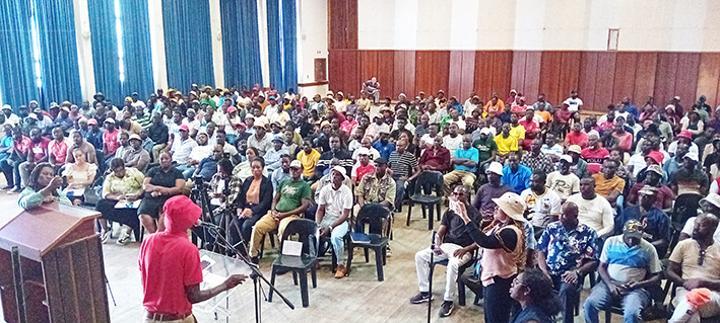Africa-Press – Namibia. Over 1 000 fishermen employed under the Government Employment Redress Programme (Gerp) will start a joint association and have a march in Windhoek to discuss their employment conditions.
The fishermen held a meeting at Walvis Bay yesterday, spearheaded by the Mining, Metal, Maritime and Construction Workers Union.
They gave suggestions on how their working and living conditions could be improved upon, saying they have been deceived by those who initiated the redress programme.
Okapale fishermen representative Matheus Gabriel suggested that quotas be handled by employees instead of companies.
“If the quota is allocated to us, we can find companies that will handle them. We have been in this industry for a long time. We know how we will handle the situation.
These companies will never help our families. The ones who put the programme in do not even return to revisit it and set things right when the companies fail. Some of us left companies without receiving our severance pay and tax money,” he said.
Gabriel noted that although the group faces similar challenges, they are divided by companies and unions who come up with useless strategies to their problems.
“We need our own combined union and decide on our own minimum wage and working conditions. Some unions also have quotas, yet they masquerade themselves as our representatives. The same unions gather somewhere in secret to decide on how poorly they want to pay us,” he said.
Merlus employees group chairperson Julia Mbuiti says the government has been treating the workers in the programme unfairly.
“If the quota is given to a certain company, there should not be a third party to employ people.
A quota was given to the Helgoland company, but was handed over to Merlus Cormorant, as they had no factory. That was already a bridge in the agreement. Employees were promised permanent employment but are not earning basic salaries.
They are working on a no pay basis. It is funny that the government is so relaxed when we ask for quotas to be revoked. We are not afraid,” she says.
The union’s general secretary, Joseph Garoeb, notes that the group will approach the Ministry of Agriculture, Fisheries, Water and Land Reform directly in Windhoek as a group.
“We are a uniformed force to fight. No employer in the programme must earn less than N$8 500. We know that the quotas allocated are enough for that. We did our numbers. If the companies are fighting with us and get more quotas, the amount must rise to more than N$10 000.
There must be longevity in terms of the pension fund, medical aid and housing allowance. The sea must become Namibianised. Employees must not only get salaries, but participate in shareholding.”
The suggested name of the association and the date of the march will be released soon.
The group of fishermen were allocated to different companies by the government under Gerp, after having been unemployed since 2015.
Eighty-two fishermen have died since the strike, while 16 became disabled and about 104 are now pensioners.
For More News And Analysis About Namibia Follow Africa-Press






